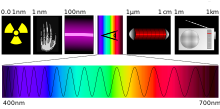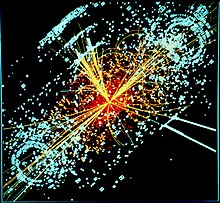Phenomenon
Jump to navigation
Jump to search

A Phenomenon (from the Greek: φαινόμενoν, phainomenon, from the verb phanein, to show, shine, appear, to be manifest, or to manifest itself), plural phenomena, refers to any observable occurrence. Phenomena are often, but not always, understood as "appearances" or "experiences." These are themselves sometimes understood as involving qualia. Immanuel Kant contrasted phenomena with the noumenon (for which he used the term Ding an sich, or "thing-in-itself") which is not directly accessible to observation; in this he was heavily influenced by Leibniz who had used phenomenon and noumenon as interrelated technical terms.
- For the 1996 romantic fantasy-drama of this name, see Phenomenon (film)
Quotes[edit]






- This kid may be the key not just to all human potential, but to all spiritual unexplained paranormal phenomena. The key to everything in The X-Files.
- Chris Carter, in The X-Files episode "The End" [5.20] (17 May 1998)
- Most students of nature sooner or later pass through a process of writing off a large percentage of their supposed capital of knowledge as a merely illusory asset. As we trace more accurately certain familiar sequences of phenomena we begin to realize how closely these sequences, or laws, as we call them, are hemmed round by still other laws of which we can form no notion. With myself this writing off of illusory assets has gone rather far and the cobweb of supposed knowledge has been pinched (as some one has phrased) into a particularly small pill.
- It can scarcely be denied that the fundamental phenomena which first led mankind into chemical inquiries are those of combustion.
- William Crookes, Address as President to the Society for Psychical Research (29 January 1897)
- Our alleged facts might be true in all kinds of ways without contradicting any truth already known. I will dwell now on only one possible line of explanation, — not that I see any way of elucidating all the new phenomena I regard as genuine, but because it seems probable I may shed a light on some of those phenomena. All the phenomena of the universe are presumably in some way continuous; and certain facts, plucked as it were from the very heart of nature, are likely to be of use in our gradual discovery of facts which lie deeper still.
- William Crookes, Address as President to the Society for Psychical Research (29 January 1897)
- The phenomena of telepathy, and the transmission of intelligence from one sensitive to another through long distances, seem to come into the domain of law and can be grasped. A sensitive may be one who possesses the telepathic transmitting or receiving ganglion in an advanced state of development, or who, by constant practice, is rendered more sensitive to these high-frequency waves. Experience seems to show that the receiving and the transmitting ganglions are not equally developed; one may be active, while the other, like the pineal eye in man, may be only vestigial. By such an hypothesis no physical laws are violated; neither is it necessary to invoke what is commonly called the supernatural.
- William Crookes, Address as President to the Society for Psychical Research (29 January 1897)
- But mainly I learned, in approaching the measurement of new phenomena, not just to consider using existing apparatus but to allow the mind to wander freely and invent new ways of doing the job.
- Val Logsdon Fitch, in his Nobel Prize Autobiography (1980), in Les Prix Nobel, published in The Nobel Prizes (1981), edited by Wilhelm Odelberg
- At any one time there is a natural tendency among physicists to believe that we already know the essential ingredients of a comprehensive theory. But each time a new frontier of observation is broached we inevitably discover new phenomena which force us to modify substantially our previous conceptions. I believe this process to be unending, that the delights and challenges of unexpected discovery will continue always.
- Val Logsdon Fitch, in his Nobel Prize Autobiography (1980), in Les Prix Nobel, published in The Nobel Prizes (1981), edited by Wilhelm Odelberg
- The number of different optical phenomena has become in our time so great that caution must be taken so as to avoid being deceived, and also to refer the phenomena to the simple laws.
- Joseph von Fraunhofer, in The Wave Theory, Light and Spectra. Prismatic and Diffraction Spectra. Memoirs by Joseph Von Fraunhofer (1981), p. 14
- I can have little patience with those who oppose … the theory of evolution or what are called "mechanistic" explanations of the phenomena of life because of certain moral consequences which at first seem to follow from these theories, and still less with those who regard it as irrelevant or impious to ask certain questions at all. By refusing to face the facts, the conservative only weakens his own position.
- Friedrich Hayek, in Why I Am Not a Conservative, in The Constitution of Liberty (1960)
- Unlike the position that exists in the physical sciences, in economics and other disciplines that deal with essentially complex phenomena, the aspects of the events to be accounted for about which we can get quantitative data are necessarily limited and may not include the important ones.
- There is but one indefectibly certain truth, and that is the truth that pyrrhonistic scepticism itself leaves standing, — the truth that the present phenomenon of consciousness exists.
- William James, in The Will to Believe (1897)
- As discontinuity marched into the world of phenomena through one door, causality walked out through another.
- James Jeans, in Physics and Philosophy (1942)
- The complete closed world consists of three parts-substratum, phenomenal world, and observer. By our experiments we drag up activities from the substratum into the phenomenal world of space and time, but there is no clear line of demarcation between subject and object, and by performing observations on the world, we alter it, much as a fisherman dragging up fish from the depths of the seas disturbs the waters and also damages the fish.
- James Jeans, in Physics and Philosophy (1942)
- One can ask two different kinds of questions with regard to the topics of study in psychology as well as in other sciences. One can ask for the phenomenal characteristics of psychological units or events, for example, how many kinds of feelings can be qualitatively differentiated from one another or which characteristics describe an experience of a voluntary act. Aside from this are the questions asking for the why, for the cause and the effect, for the conditional-genetic interrelations. For example, one can ask: Under which conditions has been a decision made and which are the specific psychological effects which follow this decision? The depiction of phenomenal characteristics is usually characterized as “description”, the depiction of causal relationships as “explanation.”
- Kurt Lewin "Gesetz und experiment in der Psychologie" [Law and experiment in psychology]. in: Symposion, Vol 1 (1927), p. 375-421, as translated by Kurt Kreppner
- Phenomena are constantly folded back upon themselves. In the vast cosmical changes the universal life comes and goes in unknown quantities, enveloping all in the invisible mystery of the emanations, losing no dream from no single sleep, sowing an animalcule here, crumbling a star there, oscillating, and winding in curves; making a force of Light, and an element of Thought; disseminated and indivisible, dissolving all save that point without length, breadth, or thickness, The Myself ; reducing everything to the Soul-atom; making everything blossom into God; entangling all activities, from the highest to the lowest, in the obscurity of a dizzying mechanism; hanging the flight of an insect upon the movement of the earth; subordinating, perhaps, if only by the identity of the law, the eccentric evolutions of the comet in the firmament, to the whirlings of the infusoria in the drop of water.
- Albert Pike, in Morals and Dogma of the Ancient and Accepted Scottish Rite of Freemasonry (1871), Ch. II : The Fellow-Craft, p. 40
- All language is symbolic, so far as it is applied to mental and spiritual phenomena and action. All words have, primarily, a material sense, howsoever they may afterward get, for the ignorant, a spiritual non-sense. To "retract," for example, is to draw back, and when applied to a statement, is symbolic, as much so as a picture of an arm drawn back, to express the same thing, would he. The very word "spirit" means " breath," from the Latin verb spiro, breathe.
- Albert Pike, in Morals and Dogma of the Ancient and Accepted Scottish Rite of Freemasonry (1871), Ch. III : The Master, p. 62
- A hypothetical theory is necessary, as a preliminary step, to reduce the expression of the phenomena to simplicity and order before it is possible to make any progress in framing an abstractive theory.
- William John Macquorn Rankine, in "Outlines of the Science of Energetics". In Proceedings of the Philosophical Society of Glasgow, 1855. p. 213
- It is possible to express the laws of thermodynamics in the form of independent principles, deduced by induction from the facts of observation and experiment, without reference to any hypothesis as to the occult molecular operations with which the sensible phenomena may be conceived to be connected; and that course will be followed in the body of the present treatise. But, in giving a brief historical sketch of the progress of thermodynamics, the progress of the hypothesis of thermic molecular motions cannot be wholly separated from that of the purely inductive theory.
- William John Macquorn Rankine, in A Manual of the Steam Engine and other Prime Movers (1859), p. 27
- In thermodynamics as well as in other branches of molecular physics, the laws of phenomena have to a certain extent been anticipated, and their investigation facilitated, by the aid of hypotheses as to occult molecular structures and motions with which such phenomena are assumed to be connected. The hypothesis which has answered that purpose in the case of thermodynamics, is called that of "molecular vortices," or otherwise, the "centrifugal theory of elasticity.
- William John Macquorn Rankine, in A Manual of the Steam Engine and other Prime Movers (1859), p. 31
- The laws of thermodynamics may be regarded as particular cases of more general laws, applicable to all such states of matter as constitute Energy, or the capacity to perform work, which more general laws form the basis of the science of energetics, — a science comprehending, as special branches, the theories of motion, heat, light, electricity, and all other physical phenomena.
- William John Macquorn Rankine, in A Manual of the Steam Engine and other Prime Movers (1859), p. 31

